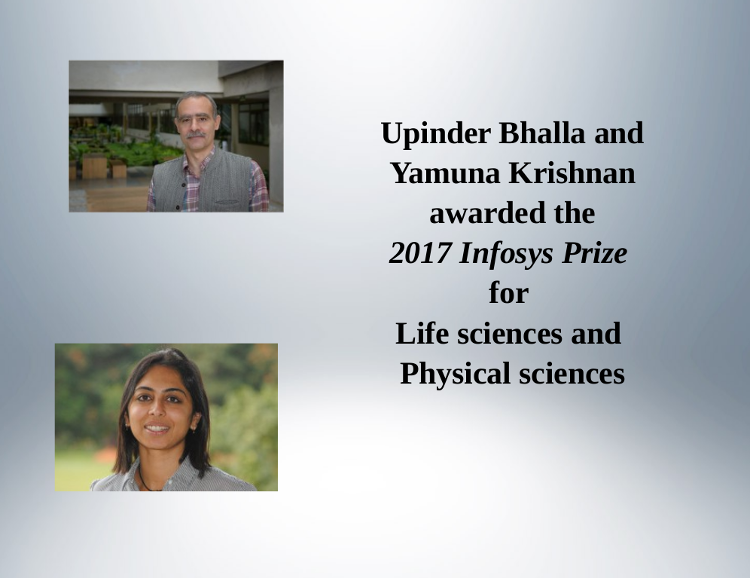The National Centre for Biological Sciences (NCBS) congratulates its current faculty member Upinder Bhalla, and former faculty member Yamuna Krishnan on winning the 2017 Infosys Prize in the life sciences and physical sciences categories!
The Infosys Prize celebrates the awardees’ outstanding achievements and is intended to honor them for the excellence of their work in their respective fields.
Upinder Bhalla, currently the Dean of NCBS, studies how memories are formed by changes at molecular, cellular and circuit levels. His team uses a combination of computer modelling, imaging, optogenetic, and electrophysiology experiments to investigate brain networks in learning and behavior. Ongoing and future work from his group will focus on how the brain combines long-term stability to maintain memories, with enough flexibility to make more memories and to integrate the two.
Bhalla’s work will not only contribute to our basic understanding of neuroscience, especially in the fields of memory and cognition, but can also have implications for biomedical research. One of Bhalla’s goals is to try and use his team’s computational models to explore how and what changes in signaling cause problems in the wiring of brain networks in conditions such as Fragile-X syndrome and Alzheimer’s diseases.
Yamuna Krishnan, who was a faculty member of NCBS from 2003 till 2014, is currently a professor at the Department of Chemistry, University of Chicago. Krishnan’s team works on creating nano-scale devices using unique assemblies of DNA. Her group has created DNA nanosensors and nano-scale drug-delivery systems that they use to probe the internal workings of living systems and biological processes.
The central theme of Krishnan’s work is ‘synthetic biology’, which she describes as ‘taking a biological device, component or concept out of its cellular context and harnessing its function in a completely new setting to probe, program or even reprogram living systems’. Currently, her group continues to work on exploring the conformational dynamics of DNA structures, and in refining DNA-based nanomachinery for a range of uses such as live-cell imaging and drug delivery.
“Till recently, the field of ‘DNA origami’ has pioneered the fabrication of intricate 'structures' using DNA pieces. The uniqueness of Dr. Krishnan's work is adding the 'function' to DNA origami structures. Her group has demonstrated how intelligent-sensors could be built for sensing organelle-specific intracellular milieus such as pH and ions in a spatio-temporal manner. This remarkable work has given a new direction to the field,” says Praveen Vemula from the Institute for Stem Cell Biology and Regenerative Medicine (inStem).
“NCBS has always nurtured excellence, and to have two of our colleagues win the Infosys Prize is certainly a proud moment for all of us here. Yamuna Krishnan conducted her pioneering work at NCBS and the Infosys Prize in Physical Sciences is a recognition of her inventiveness and spirit. Her work oin nanostructured DNA at NCBS has opened up new windows in the fields ofto sensing of cellular physiology and creating DNA-based devices for localized intracellular drug delivery. Upi Bhalla’s prize is richly deserved. He uniquely combines very sharp experiments in how the sensory system encodes information and memory that derive and drive his computational approach. His engagement in the running of affairs of NCBS has only redoubled his efforts to achieve greater heights in his research. He is an outstanding scientist and colleague whose internationally acclaimed work in computational neuroscience has been justly rewarded,” says NCBS and inStem Director, Satyajit Mayor.
About the award:
The Infosys Prize is awarded annually to researchers and scientists across six categories: Engineering and Computer Sciences, Humanities, Life Sciences, Mathematical Sciences, Physical Sciences and Social Sciences. As part of the prize, each awardee will receive a citation, a gold medal, and a monetary award of Rupees 65 lakh.
Currently in its ninth year, the first Infosys Prize was awarded for Mathematics in 2008. Prizes in four other categories were instituted following the establishment of the Infosys Science Foundation in 2009, and the sixth category – the Infosys Prize in Humanities – was announced by the foundation in 2012.
For more information please visit: http://www.infosys-science-foundation.com/prize/index.asp










0 Comments